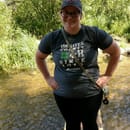“Small acts, when multiplied by millions of people, can transform the world”- Howard Zinn
- Reduceing Waste
-
Reducing your amount of waste can seem challenging. Being mindful of what you throw out can help you identify where you need to improve. In one of my classes last semester, we were challenged to collect all of our trash, compost, and recycling for a week, then weigh how much of each we collected. I was suprised at how much trash I threw out.
Asking yourself some basic questions when buying or using something can help recude waste. Do I really need to use this item? Can this item be recycled or reused? Are there reuasable alternatives? If you realize that you get something multiple times and end up throwing it away, like getting a coffee from Caribou, you might realize that it would be beneficial to buy a reusable version once, like getting a reuasable coffee cup.
- Understanding What Can and Can’t Be Recycled
-
Understanding what can and can’t be recycled in your community is important. If you throw away something that can be recycled, it goes into the landfills and adds to our waste issues. If you put something in the recycling that doesn’t belong, it can mess up the recycling system and create delays at recycling centers. Finding out what is recyclable in your area is easy. City and county government centers generally have information available for residents, either online or in their buildings. Some items can be recycled anywhere, and others can only be recycled at certain facilities.
- Composting and Reducing Food Waste
-
Composting is a great way to give back to the environment. Compost is used to fertilize crops, and it keeps food waste out of landfills. You don’t have to necessairily start a compost pile to make a difference. Being aware of how much food you throw away is important. Last summer, I realized that I was throwing away a lot of moldy bread because I wasn’t eating it often enough before it went bad. I started freezing my bread, which allows me to keep a loaf for a long time without having to eat it quickly. If you do want to start a compost collection, it is very easy to do so. There are many resources out there on starting a compost pile, and the different types of composting options.
- Reducing Energy Usage
-
Reducing the amount of energy you use is an easy change to make. Turning off lights when not using them, taking shorter showers, using cold water instead of hot water, and using sunlight during the day are all simple ways to reduce your energy usage. Reducing energy usage also saves money on electric bills.
- Commuting, Carpooling, or Walking Instead of Driving
-
Gas emissions from cars is a huge issue. Consider walking, carpooling, or taking community transportation whenever possible. If it’s a nice outside, try walking to your destination instead of driving (if it’s within walking distance of course!). Community transportation services are also a great option. Metro Valley Transit in Minneapolis has great train and bus services, and instead of paying for a train ticket or the bus fare each time, MVT has passes availble that help commuters save money.
Every little thing we do makes a huge impact. Small changes add up, even if it’s just you making them.


